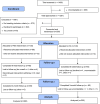Fatigue After Stroke Educational Recovery Program: A Prospective, Phase III, Randomized Controlled Trial
- PMID: 39719403
- PMCID: PMC12054429
- DOI: 10.1161/JAHA.124.034441
Fatigue After Stroke Educational Recovery Program: A Prospective, Phase III, Randomized Controlled Trial
Abstract
Background: Poststroke fatigue affects ≈50% of patients with stroke, causing significant personal, societal, and economic burden. In the FASTER (Fatigue After Stroke Educational Recovery) study, we assessed a group-based educational intervention for poststroke fatigue.
Methods and results: Two hundred patients with clinically significant fatigue were included and randomized to either a general stroke education control or fatigue management group (FMG) intervention and assessed at baseline, 6 weeks, and 3 months. The FMG involved weekly psychoeducation sessions over 6 weeks. Coprimary outcomes were the Fatigue Severity Scale and Multidimensional Fatigue Inventory-20 total scores. Adjusted mean total Fatigue Severity Scale scores at 6 weeks (primary end point) were nearly identical for the education control and FMG groups. The adjusted mean difference between treatment groups was -0.13 (SE, 1.4; P=0.92) at 6 weeks and 1.67 (SE, 1.4; P=0.26) at 3 months. Although there were no significant effects, Fatigue Severity Scale outcomes were in the direction of a treatment effect based on the estimated change. Adjusted mean total Multidimensional Fatigue Inventory-20 scores at 6 weeks (primary end point) were similar for the education control and FMG groups. The adjusted mean difference between treatment groups was -0.91 (SE, 1.54; P=0.55) at 6 weeks and -1.26 (SE, 1.8; P=0.49) at 3 months. Both groups had similar secondary outcomes (eg, Multidimensional Fatigue Inventory-20 subscales, sleep, pain, mood, quality of life) at 6 weeks and 3 months.
Conclusions: We found no evidence of significant group-level benefits of FMG over and above general stroke education. Educational group-based interventions for poststroke fatigue should continue to be refined and examined, including consideration of potential impacts at an individual level.
Registration: URL: https://www.anzctr.org.au/; UnIque identifier: ACTRN12619000626167.
Keywords: education; fatigue; intervention; stroke.
Figures



References
-
- English C, Simpson DB, Billinger SA, Churilov L, Coupland KG, Drummond A, Kuppuswamy A, Kutlubaev MA, Lerdal A, Mahmood A, et al. A roadmap for research in post‐stroke fatigue: consensus‐based core reccomendations from the third stroke recovery and rehabilitation roundtable. Int J Stroke. 2024;19:133–144. doi: 10.1177/17474930231189135 - DOI - PMC - PubMed
-
- White P, Goldsmith KA, Johnson AL, Potts L, Walwyn R, DeCesare JC, Baber HL, Burgess M, Clark LV, Cox DL, et al. Comparison of adaptive pacing therapy, cognitive behaviour therapy, graded exercise therapy, and specialist medical care for chronic fatigue syndrome: a randomised trial. Lancet. 2011;377:823–836. doi: 10.1016/S0140-6736(11)60096-2 - DOI - PMC - PubMed
Publication types
MeSH terms
LinkOut - more resources
Full Text Sources
Medical

